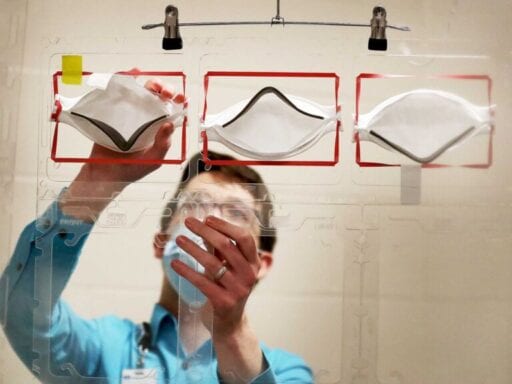Some of those suppliers are already missing deadlines.
The United States government has ordered 20 million N95 masks for health care workers through a set of suppliers that are overwhelmingly unproven and untested, according to a new report from the Wall Street Journal.
At least 80 percent of the masks, which are due to be delivered by the end of May, are being ordered from vendors which either haven’t done business with the government before or haven’t previously provided medical equipment specifically to the government. The government’s heavy reliance on untested suppliers of medical equipment raises questions about the quality of the masks, and whether they will be delivered in a timely fashion.
Some of the vendors have already missed delivery deadlines and dropped out of the process because of supply problems, according to the Wall Street Journal. Additionally, the parent company of one vendor is going through bankruptcy and has been accused of fraud in lawsuits.
The masks are being purchased for about $6 each through the $110 million contract — a price that is more expensive than the typical price of an N95 mask before the pandemic began, but is roughly in line with current market rates.
The fact that the government is counting on untested suppliers for a crucial piece of personal protective equipment (PPE) for health care providers is a worrying prospect at a time when there are widespread shortages of masks, gowns, gloves and other critical equipment for health care providers dealing with the coronavirus pandemic.
N95 masks are more complex — and more complicated to make — than a surgical mask. As Recode’s Rebecca Heilweil explains, certified N95 masks are “special”:
Unlike a conventional surgical mask, N95 masks are built so that 95 percent of very small airborne particles can’t get through. These masks also need to be approved by the CDC’s National Institute for Occupational Safety and Health and, depending on the type, the Food and Drug Administration. In order to fulfill those requirements, N95 masks must be constructed so that they seal tightly around one’s mouth and nose, unlike surgical or cloth masks which are loose-fitting. … The masks themselves are difficult to make, in part because they require specialized equipment to meet stringent regulatory standards.
The federal government has placed separate PPE orders from traditional suppliers as well — including orders for 600 million N95 masks from huge, prominent vendors like 3M and Honeywell International Inc, according to the Journal. But those orders extend through next year, and those vendors also supply masks to many other clients.
Taking a gamble on untested suppliers has already proved troublesome for other governments. For example, the British government spent $20 million on coronavirus antibody tests from an unknown manufacturer that turned out to not work.
When the government makes rushed contracts with less well-known vendors they also may be more likely to be susceptible to attempted fraud. The Justice Department recently disrupted a foreign criminal scheme in which two people or organizations attempted to fraudulently sell nearly 40 million N95 masks to health care providers in the US.
Support Vox’s explanatory journalism
Every day at Vox, we aim to answer your most important questions and provide you, and our audience around the world, with information that has the power to save lives. Our mission has never been more vital than it is in this moment: to empower you through understanding. Vox’s work is reaching more people than ever, but our distinctive brand of explanatory journalism takes resources — particularly during a pandemic and an economic downturn. Your financial contribution will not constitute a donation, but it will enable our staff to continue to offer free articles, videos, and podcasts at the quality and volume that this moment requires. Please consider making a contribution to Vox today.
Author: Zeeshan Aleem
Read More



